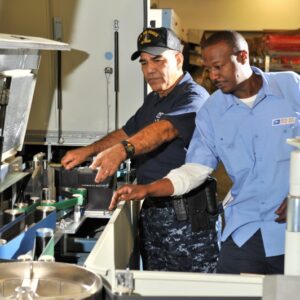May 1, 2018
MS-1 Settlement Reached
(This article first appeared in the May-June 2018 issue of The American Postal Worker magazine)
By Maintenance Craft Directors
On Feb. 27, 2018, the USPS and the Maintenance Division reached a resolution regarding the MS-1 Handbook revisions that were remanded to the parties by Arbitrator Goldberg in case Q10T-4Q-C 14171644. The MS-1 Handbook is titled Operation and Maintenance of Real Property and it “prescribes the policies, procedures, and practices governing the operation and maintenance of USPS buildings and leased space.”
There are also other Maintenance Management Orders (MMOs) that can apply and the USPS intended to issue newer versions in place of some of the language from the MS-1. The principle purpose to Maintenance Craft employees was the procedures for the staffing of the “Building-side” occupational groups. These were primarily Building Equipment Mechanics (BEM), Level 9. Some of the identified work could also be attributed to Maintenance Mechanic, Level 7 (MM-7) employees. The method of staffing these positions and the duty assignments is similar to other staffing requirements in Maintenance, such as for custodial, mail processing or field maintenance.
First, an inventory of equipment and work tasks must occur. Then, using the MS-1, frequencies and work performance standards are applied. The result is an amount of work time needed to meet maintenance requirements, provide for safety and health of occupants, and protect the USPS investment in the property. The APWU’s views very seriously take umbrage with management’s budget driven approach, which results in the degrading of our work locations and detrimental impacts on employees and customers when building equipment is not maintained and cared for properly. We waged a years-long battle with the Postal Service on this issue and the February 2018 resolution provides completion on this round.
While the Arbitrator did make some definitive rulings in his Sept. 13, 2017 award, he also decreed that, “The issues of whether the revisions to the MS-1 dealing with (a) preventative maintenance time allowances and frequencies, and (b) space adjustments and miscellaneous work time allowances violated Article 19 are remanded to the parties.”
We had several meetings with the Postal Service on this remand and went through each and every line item in the various staffing forms utilized in the MS-1 – a tedious yet important task. The input from the BEM group of unionists we utilized leading up to, as well as their expert testimony at, the hearing was of great assistance.
In the end, we addressed the remanded items and the implementation of the new process. The February agreement provides that the staffing allowances and frequencies are agreed upon and will be incorporated into an updated MS-1 and applicable MMOs.
Critically, the settlement provides, “The APWU will be provided the final draft(s) for review and concurrence prior to publication.” Not only is this an important protection against any last second deviations, which would lead to another round of dispute processing, but it also ensures that the new procedures and staffing are NOT yet released.
We also went beyond the explicit remand in securing a one-year moratorium, stating that, “There will be a 1 (one) year transition period during which staffing adjustments which impact employees will not take place.” Not to be redundant but a provision also provides, “… any excessing of employees will not occur until at least 1 (one) year from the date of signing of this settlement” (emphasis added).
The final item addressed is the handling of pending grievances in the field. Grievances can be resolved or go forward, depending on the local fact circumstances.
A copy of this settlement is available on the Maintenance Craft page of the APWU website, apwu.org/departments-divisions/maintenance.
Please be sure to communicate with your local Maintenance representatives, as well as your National Business Agents. Looking forward to seeing many of you in Pittsburgh, PA at the National Convention.
Importantly, don’t forget to say “Hi” to your steward.


